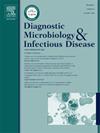Silencing of ubiquitin specific protease-15 activates components of innate immune response and inhibits dengue virus infection
IF 1.8
4区 医学
Q3 INFECTIOUS DISEASES
Diagnostic microbiology and infectious disease
Pub Date : 2025-07-30
DOI:10.1016/j.diagmicrobio.2025.117036
引用次数: 0
Abstract
Innate immune responses induced by interferons are one of the key defense mechanisms against virus infections. It is activated by specific sensors in host cells that detect particular features of viruses. Secretion of interferons stimulate interferon-stimulated genes (ISGs) that act as antiviral effectors and inhibit virus infections. Many factors, including post-translational modifications (PTMs) of host cell proteins modulate virus infections. Ubiquitination/deubiquitination is one such PTM that utilizes ligases and deubiquitinases, which viruses exploit to enhance their replication and evade immune responses. Ubiquitin-specific proteases (USPs), a group of deubiquitinases, play a major role in virus transmission by modulating the replication and propagation of viruses. In this study, we examined the role of USP-15 during Dengue virus (DENV) infection. Our results showed that USP-15 plays a crucial role in facilitating DENV replication. Knockdown of USP-15 using specific siRNAs abrogated replication of DENV in A549 cells. This was evidenced by decreased expression of DENV-NS1 and envelope protein in A549 cells silenced with USP-15. Furthermore, higher expression of MDA-5, IFN-β, and ISG-15, sensors of innate immune receptors, was noted in USP-15-silenced DENV infected cells, indicating the association of antiviral genes with USP-15. Therefore, USP-15 could be utilized as an effective target for combating DENV infection.
泛素特异性蛋白酶15的沉默激活先天免疫应答成分并抑制登革病毒感染
干扰素诱导的先天免疫反应是抵抗病毒感染的重要防御机制之一。它是由宿主细胞中检测病毒特定特征的特定传感器激活的。干扰素的分泌刺激干扰素刺激基因(ISGs),其作为抗病毒效应物并抑制病毒感染。许多因素,包括宿主细胞蛋白的翻译后修饰(PTMs)调节病毒感染。泛素化/去泛素化是一种利用连接酶和去泛素酶的PTM,病毒利用它们来增强其复制和逃避免疫反应。泛素特异性蛋白酶(USPs)是一组去泛素酶,通过调节病毒的复制和繁殖,在病毒传播中发挥重要作用。在这项研究中,我们检测了USP-15在登革热病毒(DENV)感染中的作用。我们的结果表明,USP-15在促进DENV复制中起着至关重要的作用。使用特异性sirna敲除USP-15可消除A549细胞中DENV的复制。在USP-15沉默的A549细胞中,DENV-NS1和包膜蛋白的表达降低证明了这一点。此外,在USP-15沉默的DENV感染细胞中,发现先天性免疫受体传感器MDA-5、IFN-β和ISG-15的表达更高,这表明抗病毒基因与USP-15有关。因此,USP-15可作为抗DENV感染的有效靶点。
本文章由计算机程序翻译,如有差异,请以英文原文为准。
求助全文
约1分钟内获得全文
求助全文
来源期刊
CiteScore
5.30
自引率
3.40%
发文量
149
审稿时长
56 days
期刊介绍:
Diagnostic Microbiology and Infectious Disease keeps you informed of the latest developments in clinical microbiology and the diagnosis and treatment of infectious diseases. Packed with rigorously peer-reviewed articles and studies in bacteriology, immunology, immunoserology, infectious diseases, mycology, parasitology, and virology, the journal examines new procedures, unusual cases, controversial issues, and important new literature. Diagnostic Microbiology and Infectious Disease distinguished independent editorial board, consisting of experts from many medical specialties, ensures you extensive and authoritative coverage.

 求助内容:
求助内容: 应助结果提醒方式:
应助结果提醒方式:


